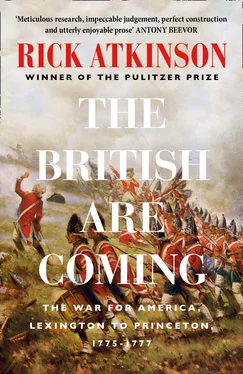For every moment when Washington drew his sword or spurred his horse to the sound of the guns, there would be a thousand administrative moments: dictating orders, scribbling letters, convening meetings, hectoring, praising, adjudicating. No sooner had he settled into Vassall House than he recognized that he personally needed to oversee the smallest aspects of the army’s operation, from camp kettles to bread quality to the $333 paid an unidentified spy—and logged in his expense book in mid-July—“to go into the town of Boston … for the purpose of conveying intelligence of the enemy’s movements and designs.” He quickly saw that unlike the fantasy army that existed in congressional imaginations—grandly intended, as Washington’s commission declared, “for the defense of American liberty and for repelling every hostile invasion thereof”—this army was woefully unskilled; bereft of artillery and engineering expertise, it was led by a very thin officer corps. “We found everything exactly the reverse of what had been represented,” General Lee complained. “Not a single man of ’em is [capable] of constructing an oven.” Washington also recognized that his own five years as a callow regimental officer had left him, as he wrote, with “the want of experience to move upon a large scale”; like every other American commander, he knew little of cavalry, artillery, the mass movement of armies, or how to command a continental force. Still, service under British officers had deeply imprinted him with European orthodoxy, including strong preferences for offensive warfare, firepower, logistical competence, and rigid discipline. He was no brigand chieftain.
Even as he immersed himself in tactical minutiae, Washington recognized that a commander in chief must be a capable strategist; that brass spyglass had to focus on the horizon as much as on the local battlefield. War, he knew, was a struggle of political wills. Winning a war did not require winning every battle; the French war had proved that. Tactical developments often had little influence on strategic success. And Washington was—instinctively, brilliantly—a political general: in the month following his departure from Philadelphia, he wrote seven letters to Congress, acknowledging its superior authority while maneuvering to get what he needed. He used all the tools of a deft politico: flattery, blandishment, reason, contrition. More letters went to colonial governors. Congress had adopted the New England militia as a national force, to be augmented with regiments from other colonies, and he was aware that placing a southerner in command of this predominately northern army was a fragile experiment in continental unity.
The coming weeks and months required intimacy with his army, building the mystical bond between leader and led. Who were they? What did they believe? Why did they fight? How long would they fight? Washington would personify the army he commanded, no small irony given the despair and occasional contempt it caused him. That army would become both the fulcrum on which the fate of the nation balanced and the unifying element in the American body politic, a tie that bound together disparate interests of a republic struggling to be born. It was the indispensable institution, led by the indispensable man, and the coupling of a national army with its commander marked the transformation of a rebellion into a revolution. “Confusion and discord reigned in every department,” Washington wrote in late July. “However we mend every day, and I flatter myself that in a little time we shall work up these raw materials into good stuff.”
Raw indeed. “We were all young,” a twenty-one-year-old captain would write, “and in a manner unacquainted with human nature, quite novices in military matters, had everything to learn, and no one to instruct us who knew any better than ourselves.” If mostly literate, they were barely educated. “What I had learnt,” wrote Stephen Olney, a soldier from Rhode Island, “was mostly rong.” The camps were full of Old Testament names: Joshua, Jabez, Ezekiel, Amos, Caleb, Nathan, Nehemiah. Guided by that ancient text, many concluded that Gage was Pharaoh, if not the Antichrist, confronted by a Chosen People who in the past three months had killed or wounded fourteen hundred British Philistines. Some, of course, were here for the six and two-thirds dollars paid each month to privates, more money than a farm laborer might earn. Others were animated by an inchoate patriotism on behalf of a nation that did not yet exist. And more than one sought “to make a man of himself,” as was said of seventeen-year-old Jeremiah Greenman, also from Rhode Island.
“Discipline,” Washington had written in 1757, “is the soul of an army.” Certainly this army was still looking for its soul. American troops, one visitor claimed, were “as dirty a set of mortals as ever disgraced the name of a soldier.” Each man lived in “a kennel of his own making.” No two companies drilled alike, and together on parade they were described as the finest body of men ever seen out of step. Their infractions were legion: singing on guard duty, voiding “excrement about the fields perniciously,” promiscuous shooting for the sake of noise, a tendency by privates to debate their officers, “unnecessary drum beating at night,” insolent “murmuring,” pilfering thirty bushels of cherries, thirty barrels of apples, and five hundred cabbages from one Chelsea farmer alone. When a small reward was offered for each British cannonball retrieved so that they could be reused, “every ball, as it fell, was surrounded with a great number of men to see who would get it first,” a lieutenant in Roxbury reported. Several lost their feet before the bounty was canceled.
The junior officers were not much better, notably those who used soldiers for personal farm labor, or falsified company returns to draw extra provisions, or pointed cocked pistols at their sergeants. Some officers, a Washington aide wrote in mid-August, were “not only ignorant and litigious but scandalously disobedient.” Many regiments elected their captains, lieutenants, and even lowly subalterns, often on the basis of civilian friendships, social rank, or political influence; the army was said to suffer from a “nightmare of liberty,” inimical to executive power. As for senior officers, few issues plagued Washington more than the endless jockeying for rank. Brigadier generals sulked and bickered all summer over seniority. When one threatened to resign in a snit, Lee wrote him in late July, “For God Almighty’s sake … for the sake of your country, of mankind, and let me add of your own reputation, discard such sentiments.” John Trumbull, a soldier, artist, and the son of Connecticut’s governor, wrote while serving in Roxbury, “Officers grumbling about rank and soldiers about pay, everyone thinking himself ill-used and imposed upon.”
For hours and days on end, Washington rode from Chelsea to Roxbury and back—inspecting, correcting, fuming—then returned to Vassall House to issue another raft of detailed, exhortatory commands. In the three months following his arrival in Cambridge, the commander in chief on five occasions, in general orders, condemned excessive drinking. Four times he demanded better hygiene. Thirteen times he pleaded for accurate returns from subordinate commanders to gauge the size and health of the army. Company rolls were to be called twice daily, and orders read aloud to ensure comprehension, if not obedience. No man was to appear on sentry duty who was “not perfectly sober and tolerably observing,” nor was anyone to appear in formation “without having on his stockings and shoes.” Fines were levied: a shilling for swearing, two shillings sixpence for unauthorized gunplay. Courts-martial dealt swift justice to erring officers. More than two dozen would be convicted in Washington’s first months of command, for offenses ranging from cowardice or other misbehavior at Bunker Hill—five officers found guilty—to defrauding men of their pay, embezzling provisions, and stabbing a subordinate. Most were cashiered in disgrace.
Читать дальше












